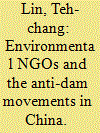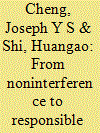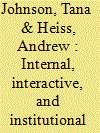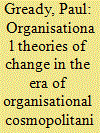|
|
|
Sort Order |
|
|
|
Items / Page
|
|
|
|
|
|
|
| Srl | Item |
| 1 |
ID:
072627


|
|
|
|
|
| Publication |
2006.
|
| Summary/Abstract |
For nearly ten years, nongovernmental actors have raised concerns about the increased accessibility of small arms and light weapons around the world. By the late 1990s, hundreds of these nongovernmental actors began to coalesce together in an effort to enhance awareness, conduct research and affect policy relevant to small arms issues. How did this NGO coalition emerge? How does it operate? How effective has it been? Where is it headed? To answer these questions we seek to assess the structure and activities of the SAM based on existing understandings of transnational social movements. We focus specifically on the emergence, structure and effectiveness of the SAM-a movement that has, according to many of its participants, founders and observers, struggled over its years of operation to achieve its objectives. Moreover, we offer a comparative analysis of the successful International Campaign to Ban Landmines in an effort to demonstrate similarities and differences in the two transnational organizations. Our findings lead to a number of recommendations we believe the SAM should heed to become more effective.
|
|
|
|
|
|
|
|
|
|
|
|
|
|
|
|
| 2 |
ID:
170030


|
|
|
|
|
| Summary/Abstract |
It is now commonplace for scholars to note that the number of international nongovernmental organizations (INGOs) has exploded. But, in recent years, the growth rate of INGOs globally and in the United States has stagnated. We argue this stagnation can best be explained by changes in the environment in which INGOs work. Specifically, the now dense population environment discourages new INGOs from being founded, while also encouraging competition. Analysis of a new, comprehensive dataset on American INGOs between 1992 and 2012 supports the argument, as do case studies of trends within the environmental conservation and democracy assistance sectors. The analysis suggests that debates about INGO cooperation and competition overlook a key environmental factor that varies across and within populations of organizations: density. We draw out the implications of this approach for contemporary global governance.
|
|
|
|
|
|
|
|
|
|
|
|
|
|
|
|
| 3 |
ID:
080295


|
|
|
|
|
| Publication |
2007.
|
| Summary/Abstract |
The nature of state-society relations in China has been undergoing a process
of change over the past few decades. It is a process that cannot be obscured, in
which the state and society are incessantly shaping and reshaping their relations. In
the wake of market-oriented reforms, and due to the emergence of environmental
non-governmental organizations (NGOs), the Chinese state has also gradually opened
up to the international community, allowing the linkages between international and
domestic NGOs to be enhanced, and this has further transformed state-society
relations in China. Focusing on the development of environmental NGOs, this
article provides insights into China's changing state-society relations and explores the
key factors that greatly facilitate the transformation of these relations. The anti-dam
movements, which have developed in reaction to the Three Gorges Dam and the
Nujiang project, as well as the issues of resettlement and environmental protection
associated with the dam construction, have caused a new wave of interaction between
the state and society and resulted in a new social movement with Chinese
characteristics
|
|
|
|
|
|
|
|
|
|
|
|
|
|
|
|
| 4 |
ID:
112429


|
|
|
| 5 |
ID:
148679


|
|
|
|
|
| Summary/Abstract |
Scholars and practitioners agree that international nongovernmental organizations (INGOs) have become important actors in international relations and policymaking. But an understanding of INGOs’ impact requires a step back, analyzing how and why they behave as they do. We develop a framework that sorts and links relevant factors into three interlocking layers: (1) internal traits of an INGO, (2) interactions between an INGO and other actors, and (3) the overall institutional environment that defines the boundaries of INGO action. To demonstrate the merits of the framework, we review and analyze Internal Affairs by Wendy Wong, The Opening Up of International Organizations by Jonas Tallberg et al., and Borders among Activists by Sarah Stroup. Locating each book within its intended scholarly context, we evaluate contributions to individual layers in our framework. We also examine ties among the books, examining how each work implicitly treats other layers. By uniting internal, interactive, and institutional factors into a holistic framework, we reveal links within existing work on INGOs and illuminate promising avenues for future work about these important actors.
|
|
|
|
|
|
|
|
|
|
|
|
|
|
|
|
| 6 |
ID:
185575


|
|
|
|
|
| Summary/Abstract |
China's ascendancy as a global development actor has significant implications for geostrategic dynamics and international development. While the push to ‘go out’ has been seen as a major strategy of the Chinese state, the actors are increasingly diversifying, including Chinese state agencies, businesses and non-governmental organizations (NGOs). We analyse the inconspicuous but important involvement of international NGOs (INGOs) in China's globalizing strategy. Drawing on in-depth interviews, we develop an integrated framework for INGOs as intermediaries in China's ‘going out’ strategy, based on the content of intermediary support (tangible vs intangible resources) and the function of the intermediary (bridging vs initiating). These intermediary roles have implications for how INGOs navigate conflicts between their domestic work in China and their outbound efforts, INGO legitimacy as actors that promote global norms or as ambassadors of the party-state, and the extent to which they facilitate Chinese expansion and soft power or shape China's global engagement. We show how INGOs as northern actors continue to play a role in South–South Cooperation. Our findings shed light on how global civil society chooses to invest its significant material and discursive resources, and how global actors under authoritarianism internalize, resist or promote its projects.
|
|
|
|
|
|
|
|
|
|
|
|
|
|
|
|
| 7 |
ID:
124189


|
|
|
|
|
| Publication |
2013.
|
| Summary/Abstract |
This article argues that organisational cosmopolitanism is an increasingly common characteristic of international ngos. Cosmopolitanism goes beyond international staffing, to include multi-sectoral mandates, multiple skill sets and multiple levels of working. It also challenges the orthodoxies of its parent discourses. Change within such international ngos represents a new frontier in organisational change, as its ambit and ambition extends beyond the demands of more conventional intra-sectoral change. Using ActionAid as a case study, the article explores what might be gained by rendering explicit previously implicit theories of change within such a context. It focuses on inward looking, organisational change but also explores connections to outward looking, operational change. The article highlights two change-related concepts that are of relevance to cosmopolitan organisations: organisational archaeologies (implying layered, hybrid, evolutionary change) and cycles of misalignment followed by realignment. Lessons learned for cosmopolitan organisations from the ActionAid case study suggest that cycles of internal reflection and planning are an effective way of managing other aspects of change.
|
|
|
|
|
|
|
|
|
|
|
|
|
|
|
|
|
|
|
|
|